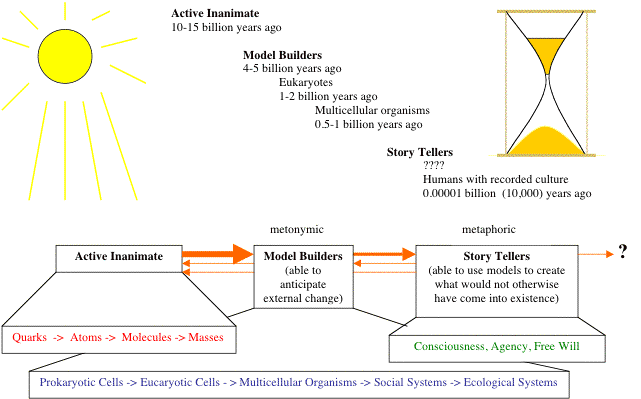Selfish genes, selfish genes, exploration within a fixed landscape/library, emergent meaning/intentionality/morality within that constraint
"Darwin has shown us how, in fact, EVERYTHING is just such a product [of mindless purposeless forces] ... Darwin offers us [a convincing explanation of how God is distributed in the whole of nature]: it is in the distribution of Design through out nature, creating, in the Tree of Life, an utterly unique and irreplaceable creation ... that wonderful wedding of chance and necessity ... [that] just happened to happen, in the fulness of time ... it did make the ivy twine and the sky so blue, so perhaps the song I love tells a truth after all ... it is surely a being that is greater than anything any of us will ever conceive of in detail worthy of its detail ... I can stand in affirmation of its significance." (p 520)
Paul's Brain: Admiration and awe is all very fine, but I want to be an agent, to MATTER, not only to be shaped by but to shape. So ...
- If evolution is genuine, the story DOESN'T end (Dennett notwithstanding)
- And needn't, if one looks a little more closely at the brain than Dennett does ...
- There IS more there than genes and memes, certainly more cranes and perhaps even a skyhook created by cranes ...
|
were not present at the beginning They are instead themselves outcomes of an evolutionary process and, From the Active Inanimate To Models to Stories to Agency (and Back Again)
|
From the active inanimate to model builders ...
adaptive, sophisticated, creative entities lacking "consciousness", "intentionality", internal sense of "meaning", internal sense of "self/other", internal sense of "time" ...
things acting in ways that cause story-tellers to infer the existence of properties that don't in fact come into existence until story-tellers had evolved and created them
- Organization in the absence of "intent"
The Game of Life 
http://template.bio.warwick.ac.uk/staff/amillar/Video.html - Purposive behavior in the absence of "purpose"
Langton's Ant
Circadian rhythms in plants - Choosing in the absence of "choice"
Bacterial movement and feeding
Euglena phototaxis - Cooperation in the absence of "morality"/"altruism"
(forget "selfish gene"; remember genes lack "intent", selection acts not on genes but on organisms)Flocking
Ant foraging
Prisoner's Dilemma, making the pie bigger, unconsciously/deliberately - Communication in the absence of "language"
Beyond signalling "language" is ... ?
(a way of exploring new possibilities of understanding?) - Social organization in the absence of "culture"
Beyond social interaction "culture" is ... ?
(a way of exploring new possibilities of human interactions?)
From the model builders to the story tellers ...
accelerating the process of exploration, without and with language ...
recognizing models, using the models themselves to bring about new things ...
what more do the WORDS mean? what more do we think we can do? and if we can, how?
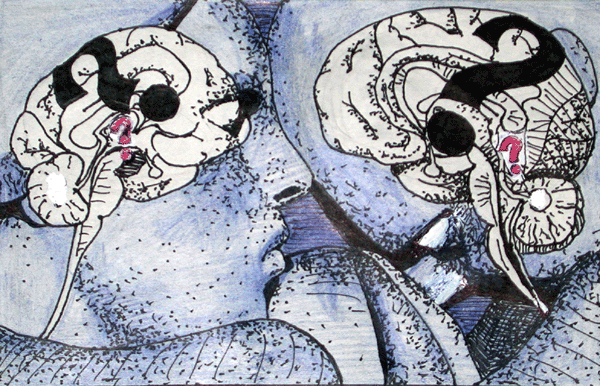
- the bipartite brain as a product and an accelerator of evolution
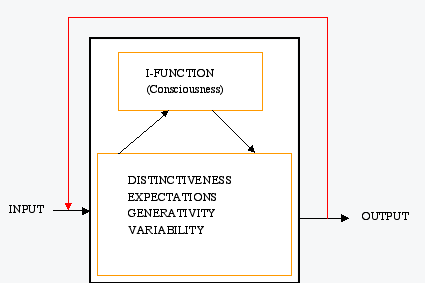
- "thinking" without language (creating with pictures, movements, etc; for "with" see below)

By Roger N. Shepherd, from The Minds Eye: Finding Truth in Illusion

From Almost Real
- "morality" without/with language

HONOR THY FATHER
- "personal responsibility" without/with language
THOU SHALT NOT COMMIT ADULTERY
- story telling without/with "time"
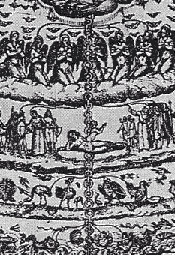
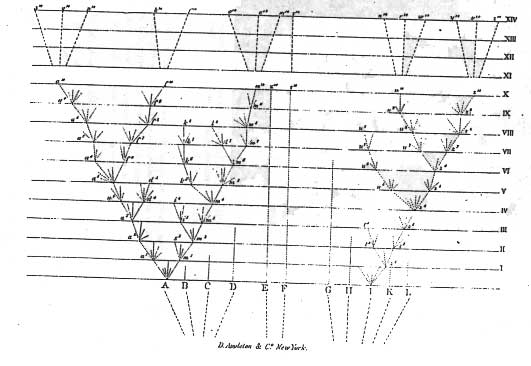
- language/language-based culture as an accelerator of the accelerator
Words can bring into potential existence things that had not previously existed (and themselves have causal efficacy, reproduce, etc = "memes")
- "Time" - the idea of time as a location makes potentially possible time travel
- "Altruism" - as a distinctive characteristic different from simply mutual interdependence/cooperation make potentially possible behaviors which are not for certain in one's own self-interest and don't fit existing models/stories
- "I am, and I can think, therefore I can change who I am"
- An example?
- "Story" - as something more than model-building and narrative makes possible "platonism", "great chain of being", "creationism", "evolution" and ... changes both in "self" and in "culture"?
- Brings into existence not only time, altruism, etc but also "self"?
A BIG crane, maybe even a skyhook, created by the cranes?:
"I am, and I can think, therefore I can change who I am" and the libraries, search landscapes as well?
Evolution ...
- The active inanimate ... trying out new things (combinations of stuff), seeing whether they last
- Model builders ... trying out new things (inanimate and animate, combinations of both), seeing whether they last
- Story tellers ... trying out new things (inanimate, animate, and story, combinations of all), seeing whether they last, knowing one is doing it?
- Language based story tellers ... trying out new things (inanimate, animate, story, language based stories, combinations of all), seeing whether they last, knowing one is doing it
To be continued ...
|
Key points are adding to Dennett importance of randomness in context of bipartite brain .... Assertion that with this addition one gets not only awesome reality but personal agency Core issue: is the search space actually being reshaped by human action? Earlier issue, is it being reshaped by model-builders? Yes, in sense of new niches being created, but no in sense that all one has is particular organizations of matter and those in principle all imaginable in advance (the library) ... in this case, randomness gets one to new places but arguably all in same ("God's eye view") in advance imaginable search space. With bipartite brain, what can be created is not previously imaginable (hence no "God's eye view) possibilities, some at least of which can in fact be implemented ... this in turn changes the search space in various ways, including at least potentially quite fundamental ones, ones not characterizable in terms of assemblies of matter? If so, the cranes have in fact yielded a skyhook ... a potential ability to reshape by previous intent ... Toughest problems
Addenda: March 3 March 4 |
